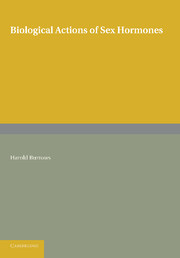CHAPTER V - A General View of the Gonadal Hormones
from PART II - GONADAL HORMONES
Published online by Cambridge University Press: 05 June 2016
Summary
Experimental investigation. Chemical structure. Sources, functions and excretion. Bisexual activities. Co-operative and antagonistic effects between different hormones. Factors influencing biological action. Gradients of responsiveness. Reversible and irreversible effects. Actions common to gonadal and adrenal hormones. Influence of gonadal hormones on behaviour and on tissue growth.
THE gonadal hormones are chemical substances which regulate the male and female characters of the body, and control sexual impulse and behaviour. A conspicuous part of their function is to stimulate the growth and activity of the accessory genital organs. In the absence of these hormones the accessory organs of reproduction would not come into existence, or if already present, would not attain full development.
John Hunter (1728-1793) (1837b) perceived that the sexual characters depend largely on gonadal activity. He remarks that before puberty there is not much to distinguish the male from the female, and that the special features of the two sexes appear mostly at the time of puberty. He further notes that the female, after the reproductive period has ended, loses some of her feminine attributes and in appearance tends to approach towards the male, or more properly perhaps, he says, towards the hermaphrodite.
The output of gonadal hormones from the gonads and other organs is regulated by the pars anterior of the pituitary gland the activity of which is itself controlled, not only by the gonadal hormones formed in response to pituitary action, but by many additional influences. The complexity of the biological machinery is manifest, and it may be difficult to predict or to observe in detail all the results of disturbing any one part of the endocrine system which is concerned with reproduction.
In recent years our knowledge has rapidly extended, and, while admitting that pur comprehension of the subject is still primitive, there are now sufficient ascertained facts to allow a useful discussion.
Experimental Investigation of the Action of Gonadal Hormones
This was impeded in the past by a number of intrinsic difficulties. At the beginning the investigator had to draw conclusions from the effects of removing or transplanting whole organs or portions of them, or else from the results of injecting crude tissue extracts.
- Type
- Chapter
- Information
- Biological Actions of Sex Hormones , pp. 96 - 151Publisher: Cambridge University PressPrint publication year: 2013

